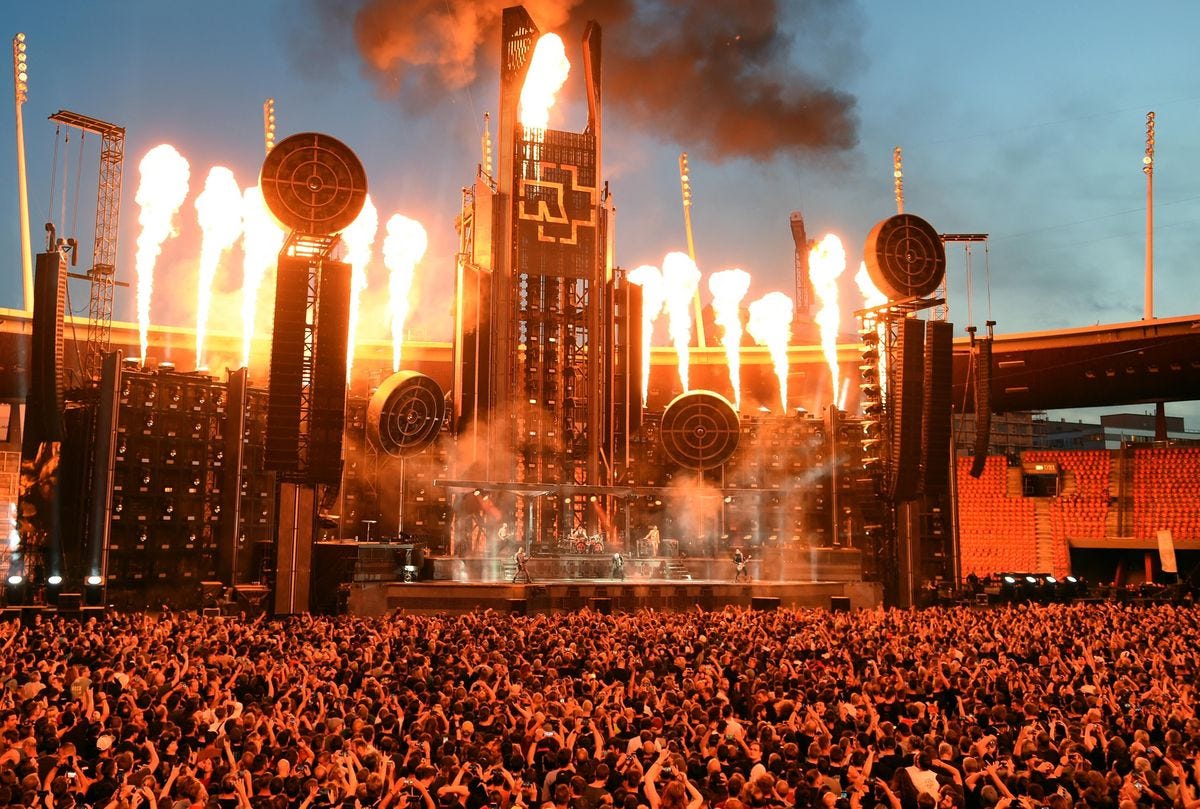“The first stage of the economy’s domination of social life brought about an evident degradation of being into having — human fulfillment was no longer equated with what one was, but with what one possessed. The present stage, in which social life has become completely dominated by the accumulated productions of the economy, is bringing about a general shift from having to appearing — all “having” must now derive its immediate prestige and its ultimate purpose from appearances. At the same time all individual reality has become social, in the sense that it is shaped by social forces and is directly dependent on them. Individual reality is allowed to appear only if it is not actually real.” ― Guy Debord, The Society of the Spectacle
To my eternal discredit, I got severely hooked on Rammstein last year, a consequence of a natural proclivity for rock music combined with my out-of-control obsession with the German language. Rammstein is the perfect band for German students: The enunciation practiced by singer Till Lindemann is otherworldly, though its proximity to stage German—Bühnendeutsch, erected in the 19th century for the German theater and subsequently practiced by a certain Austrian housepainter—has led to occasional accusations that Rammstein is a Nazi band. They’re not; they just know the value of controversy, which honestly ain’t that great, but moving on: Their crystal clear texts are a boon to the student of the language, who then risks getting snagged on the barbed wire pop hooks disguised as galloping metal ostinatos characteristic of the so-called Neue Deutsche Härte—New German Hardness—a genre resembling steel wool rubbed rapidly on the ears, save for this one act reaching for, and who knows, maybe they’ve touched crossover success. It’s still an acquired taste but sweetened with the profusion of terrific words that emanate from their lyrics.1 Among Rammstein’s gifts to me was Gift—the German word for poison.
A fair distance from Rammstein stands Muse, the English rock band that channels a lot of U2 and Queen but which is also the heir to England’s progressive giants from the 1970s—ranging from Yes to King Crimson with a stopoff at Pink Floyd.2 Their high-flying, arching melodies have an anthemic quality that honestly wouldn’t sound out of place emerging from several tens of thousands of soccer hooligans. Everything is frenetic 16th note rhythms and unexpected modulations like the iridescent patterns on the feathers of crows. Basslines travel along lengthy sloping paths, dipping down into shadowy valleys or climbing to barren windblown heights, tempting us to jump right the fuck off.
Both of these bands are almost indescribably huge. Pack a soccer stadium huge. 60,000—almost twice the number of Ukrainian troops taking part in the summer offensive—isn’t an unreasonable estimate at the crowds that sprawl out from the stage in some of their videos. The stage looks like a postage stamp floating in a dark, rippling lake.
They’re also dramatic and extravagant at once. Rammstein is like a bad dream crossed with a vaudeville act, the band decked out like extras from a Mad Max movie wielding guitar-mounted flamethrowers and singing into flaming microphones while tall black chimneys blurt out house-sized balls of flame which resolve into black puffs of smoke. Band as factory. Or battlefield.
Muse sports some pretty massive pyrotechnics as well, but the tone is lighter. One show I watched concluded with what must have been many tons of confetti dropped on the audience—at one point it’s so thick in the air it looks like a blizzard. People are barely visible. Fleets of balloons come drifting down. Somewhere a sailor kisses a nurse. Completely absurd.
I can’t help but wonder what it takes to do stuff like this. Bands like these are an alchemy of art and technology. One can argue about the art but the technology is undeniable. The Beatles’ little combo amps couldn’t even compete with the wailing of the crowd, while Beethoven, the poor sod, didn’t even have gasoline, much less video walls and computerized light displays. People ask what famous person you’d like to have dinner with. Fuck that. I want to take Wolfgang Mozart to a Nine Inch Nails concert.
Anyway, I reckon there’s an decent chance this kind of massive public spectacle is near its zenith. Is it more efficient to entertain 60,000 people at once? No doubt, but what does it cost to literally set bathtubs full of petrol on fire in the name of entertainment? I have no idea whether the math works out, whether it will continue to work out. I just know that nothing can get bigger forever.
Once upon a time, in the distant past when I was inexplicably pursuing a master’s degree in music history, I got a little gig writing program notes for a performance of Olivier Messiaen’s Quartet for the End of Time.3 It’s an interesting piece of music, written for an odd collection of instruments—clarinet, violin, cello, and piano. These were the instruments that were available to Messiaen and his fellow prisoners of war, captive in Stalag VIII-A in Görlitz, Germany from 1940. There’s an austere quality to the music that you can’t reproduce in a world of plenty. History is punctuated with music like this, from Heinrich Schütz’ Kleine geistliche Konzerte, small ensemble pieces produced amid the ruin of the Thirty Years War, to Maurice Ravel’s Concerto for the Left Hand, written for the Austrian pianist Paul Wittgenstein, who lost his right arm in the First World War.
I don’t know if another such constriction is coming, but when I look into the future I remember watching Nina Nastasia4 play guitar and sing, unamplified, from ten feet away in a cafe not much larger than my livingroom. Everyone present kept perfectly silent so as to avoid disturbing the intimacy of the moment. There were no pyrotechnics, no towering, flailing mechanized props, not even the mediation of electricity. And it wasn’t necessarily that it was better, though I would contend it was more real, and as such it lives in my memory in a deeper place than any massive, blazing festival of overwhelming sight and sound.





Bandwurmwörter.
Srsly though, it's an interesting question. I'll probably answer it at length in a future installment of das Rotenlehmbestiarium.